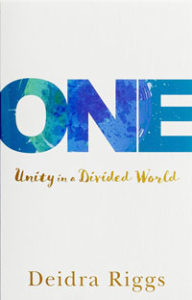 We’re looking ahead to the fall this month, sharing fall kickoff resources on our Courageous Storytellers membership site. One thing that’s coming this fall that we may be dreading—mid-term elections here in the U.S. The 2016 election season felt especially fraught with division and discord. So what can churches do as we approach election season once again?
We’re looking ahead to the fall this month, sharing fall kickoff resources on our Courageous Storytellers membership site. One thing that’s coming this fall that we may be dreading—mid-term elections here in the U.S. The 2016 election season felt especially fraught with division and discord. So what can churches do as we approach election season once again?
We talked with Deidra Riggs, author of the book One: Unity in a Divided World, about how churches could bring peace and unity even in the midst of a heated political season.
It Feels So Divided
Our society is so sharply divided politically right now. What can churches do to bring unity?
I strongly believe one important element—perhaps the most important at this moment?—is for all of us to accept, believe, and agree that our society is no more sharply divided today than it ever was.
What’s different about our current experience is that the division is being revealed to everyone. For some, this revelation is the result of finally waking up to the truth of who we are. For others, the revelation is the result of the power of social media to amplify voices that have been kept quiet by false hierarchies. These false hierarchies are based (albeit, for the most part, unrecognized and/or denied) primarily in fear (which often manifests in anger), pride, and false understanding of what “power” means in a Christian context.
So, the first thing churches can do is to learn about and then teach history correctly. We cannot leave out the truths of our country’s DNA, which includes enslavement, the destruction of families, genocide, sexism, classism, avarice, interment, colonialism (which is theft of persons and property, and begins with covetousness). Church leaders must be forthright in their denunciation of the continuation of these practices—not in a way that leads to shame, but in a way that leads to individual and corporate repentance, sincere and authentic apology, putting things right, activism, continual education, and submitting to the teaching of people of color who can help lead the way.
How Do We Talk About It?
How do we even talk about it when those divisions exist within the church itself?
When we approach the concept of division in the Church and among those who attend our churches, we must learn to do so without qualifying those divisions or the people whose opinion about this thing or the other is different from ours. Division and opinions are neither good or bad. Our reactions to these divisions and opinions are where we often lose our footing. We qualify the division or the opinion as either good or bad, when it is neither. It just is.
Church leaders have a wonderful opportunity to lead here. But first, we must face up to our own blind spots, biases, and sins against others. When church leaders do the hard work of tearing down the walls and erasing lines of divisions that exist around their individual interpretations of the gospel, it is one of the very best gifts they can give to those whom God has placed under their care.
When this happens, the life of the church leader becomes an indisputable testimony to those watching the way she lives, leads, and loves. And that is where the power lies—in love. When a church leader (or any leader, for that matter) is transformed by the power of Love (which is the only true power), the Church will become the agent of God’s grace, love, mercy, hope, joy, and promise that she was always meant to be.
Make It Work Practically
How does that work itself out in things like sermons and email newsletters and Facebook posts? It’s one thing to share a flowery quote about unity on social media, but what can church communicators do to help people really engage with this struggle?
There is no way to overemphasize the importance of love as motivation. Always, always, always check your motivation. I find that if my motivation is anything other than love—a love that includes everyone and leaves out no one and is not just a concept but a real, living, breathing kind of love—then it is probably rooted in my own ego. As people of faith, our ego is hardly ever the best place to begin. It happens, though. We are human. We react rather than respond. I do. But, as we give ourselves over, more and more, to Love, our ego and our need to be “right” or to be justified becomes smaller and smaller.
We must let go of fear. We must. We have been told, 365 times in the scriptures: “Fear not.” Let it go. Fear often shows up as anger. Anger is not always fear, but fear often looks like anger. Do not act out of anger, except to offer your anger to God for examination. Then, when you and God have dealt with your anger and your fear, write or speak your sermon, send your newsletter, publish your post. Anger is not bad, but it is our job to respond through our anger rather than reacting to it.
Unity While Still Taking a Stand
 One thing that struck me about One is that it’s never clear what “side” you’re on. A lot of times in these discussions we want someone to be on our side telling the “other side” how wrong they are. On one hand, I love that. It helped me wrestle with your arguments. On the other hand, it seems impossible. Is neutrality really a solution? How can we bring unity while still taking a stand on issues we believe in?
One thing that struck me about One is that it’s never clear what “side” you’re on. A lot of times in these discussions we want someone to be on our side telling the “other side” how wrong they are. On one hand, I love that. It helped me wrestle with your arguments. On the other hand, it seems impossible. Is neutrality really a solution? How can we bring unity while still taking a stand on issues we believe in?
I think it’s both/and, but one piece of the puzzle at a time.
I believe unity facilitates justice. So, let’s be clear first that unity is not “sameness.” When I talk about unity, and when Jesus prayed that we would be one (John 17:21), it’s not a desire to erase our individuality, or even our opinions about things. Instead, it’s a desire to see us be for one another, even when we don’t see things the same way. It’s a desire for us to understand that we belong to one another; we are in this together. We are inextricably connected to one another, and there is nothing that can break this connection, though we often refuse to see it. We are connected to the sex offender, the racist, the terrorist, the white supremacist, the President, the drug addict, the pedophile, the murderer, the tax evader, the Republicans and the Democrats.
We say we get that, but we don’t. We would know it if we actually believed this. We would see it. News broadcasts would be about five minutes long each day.
So, if we can get to unity, then we will see justice. We will see things being made right in our world. We would stop having to take blood pressure medication and we would have no need for websites like this, or books like mine. I seek unity first because I believe it is God’s will for us, because God knew without it, we would turn on one another and injustice would grow out of control. And it has.
Bring People Together
So a sermon before election day probably isn’t going to change much. What do you see churches doing to really make people ‘come together,’ as you envisioned in the book’s author’s note?
There is nothing you or I or any church leader can do to change any of this unless we first do our own work (and it is continual) of repentance, apology, and surrendering our prejudices (and the rationalizations for them) to God. Until we, as individuals learn the true history of our country and our religion and begin to own that truth, we will have zero impact on any of this. Until we are willing to choose unity over being right, we keep building walls and drawing lines.
So, the journey (as is usually the case) begins within. Practically speaking, I recommend meditation. Sit quietly (quiet is such a gift) for about five minutes each day, and see what happens. Start there.
More:
Learn more about Deidra Riggs on her blog or check out her book, One: Unity in a Divided World.





Paul Steinbrueck
June 26, 2018
I appreciate this post because I believe one of the ways the church should stand out in contrast to the world is through our unity and our ability to love one another dispite our differences.
One of the biggest things that is creating division within the church is that many people in our country including many in our local churches have their primary identity in something other than Christ. We see ourselves as Republican or Democrat, white or black, male or female, gay or straight, Lutheran or Baptist, pastor, teacher, communicator, or designer. When we see ourselves first and foremost as follower of Jesus – as sinners who have been saved by the grace of God, then the divisions fade into the background. So, my advice for churches that want to see more unity is to preach and teach Galatians 3:28, “There is neither Jew nor Gentile, neither slave nor free, nor is there male and female, for you are all one in Christ Jesus.”
A second thing that is creating division within the church is most American Christians mistakenly believe the Kingdom of God is either the conservative right’s vision for America which is all about government enforcement of morality or the progressive left’s vision for America which is all about the government elimination of injustice and suffering. Jesus was rejected and crucified because the people of His day expected the Messiah to be an earthly king. Ironically, Christians today are making the same mistake, thinking the Kingdom of God can be brought about through government. Both the political left and political right have made government an idol, looking to government for our provision and protection instead of God.
I believe the evil one is using the false dichotomy of the left-right divide in this country to distract and create dis-unity within the body of Christ. For anyone who feels the same way, I recently read an excellent book that gets to the heart of the matter. http://insurgencebook.com